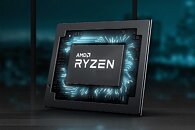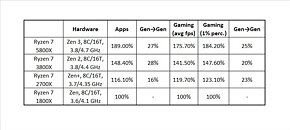Monday, December 21st 2020

The Ultimate Zen: AMD's Zen 3 Achieves 89% Higher Performance Than First-generation Zen
An investigative, generation-upon-generation review from golem.de paints an extremely impressive picture for AMD's efforts in iterating upon their original Zen architecture. While the first generation Zen achieved a sorely needed inflection point in the red team's efforts against arch-rival Intel and its stranglehold in the high-performance CPU market, AMD couldn't lose its vision on generational performance improvements on pain of being steamrolled (pun intended) by the blue giant's sheer scale and engineering prowess. However, perhaps this is one of those showcases of "small is nimble", and we're now watching Intel slowly changing its posture, crushed under its own weight, so as to offer actual competition to AMD's latest iteration of the Zen microarchitecture.
The golem.de review compares AMD's Zen, Zen+, Zen 2 and Zen 3 architectures, represented by the Ryzen 7 1800X, Ryzen 7 2700X, Ryzen 7 3800X and Ryzen 7 5800X CPUs. Through it, we see a generational performance increase that mostly exceeds the 20% performance points across every iteration of Zen when it comes to both gaming and general computing workloads. This generational improvement hits its (nowadays) most expressive result in that AMD's Ryzen 7 5800X manages to deliver 89% higher general computing, and 84% higher gaming performance than the company's Zen-based Ryzen 7 1800X. And this, of course, ignoring performance/watt improvements that turn the blue giant green with envy.
Sources:
Golem.de, via 3D Center, via Reddit user @ Voodoo2-SLi
The golem.de review compares AMD's Zen, Zen+, Zen 2 and Zen 3 architectures, represented by the Ryzen 7 1800X, Ryzen 7 2700X, Ryzen 7 3800X and Ryzen 7 5800X CPUs. Through it, we see a generational performance increase that mostly exceeds the 20% performance points across every iteration of Zen when it comes to both gaming and general computing workloads. This generational improvement hits its (nowadays) most expressive result in that AMD's Ryzen 7 5800X manages to deliver 89% higher general computing, and 84% higher gaming performance than the company's Zen-based Ryzen 7 1800X. And this, of course, ignoring performance/watt improvements that turn the blue giant green with envy.


42 Comments on The Ultimate Zen: AMD's Zen 3 Achieves 89% Higher Performance Than First-generation Zen
Hard to compare Intel through 4 Generations.
7700k was a 4/8 Core Part
8700k was a 6/12 Core Part
9700k was a 8/8 Core Part
9900k was a 8/16 Core Part
10600k was a 6/12 Core Part
10900k was a 10/20 Core Part
9700k is 0.2% faster in CPU tests & 2% faster in Gaming(720p) than the 8700k.
10600k is 5.2% faster in CPU tests & 2.2% faster in Gaming(720p) than the 9700k
Total uplift in 3 generations is 5.4% in CPU tests & 4.2% faster in Gaming(720p).
If we ignore the core parts and only go by flagships for 4 generations(which ignores this AMD comparison, based off of cores):
10900k is 42% faster than the 7700k in CPU tests & 11.8% faster in Gaming(720p) based off of the 8700k review that has the 7700k, and the 10900k review with the 8700k in it.
Meanwhile, intel bragging with 1% increase gen-over-gen...
How were those figures achieved?
And they go as low as the 1800X as the start point not 2nd gen.
Ummm wasn't/isn't AMD green? and ATi red?
www.buildorbuy.org/themes/1024/directron_amd-xp.gif
2.bp.blogspot.com/-OXtTelrwIgc/TeIiR0FGcQI/AAAAAAAAAS8/kkh9BvfBe2o/s1600/Amd+Athlon+Wallpaper4.jpg
In German, btw.
Also since Ryzen, I don't think that I've seen them used the classic green logo on their official document, right now is either black or white...